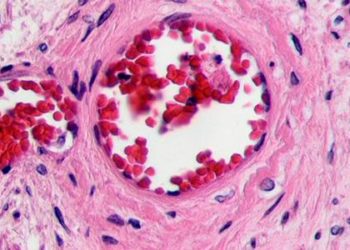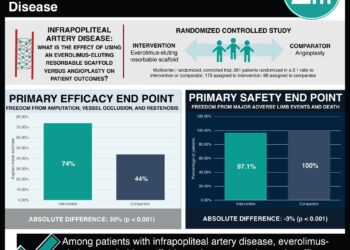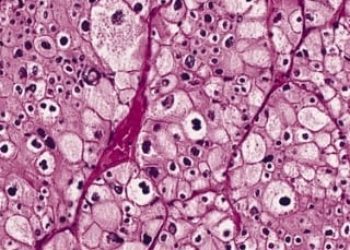Extraordinary response, and resistance, to everolimus in thyroid cancer pinned to mutations
1. A metastatic anaplastic thyroid cancer with inactivation of tumor suppressor gene TSC2 and overactivation of the mammalian target of rapamycin (mTOR) pathway proved exquisitely sensitive to everolimus, an inhibitor of mTOR, providing 18 months of treatment response before development of acquired tumor resistance.
2. The resistant tumor harbored a somatic mutation in the MTOR gene that conferred resistance to mTOR pathway inhibition but remained susceptible to mTOR kinase inhibition.
Evidence Rating Level: 4 (Below Average)
Study Rundown: Studies involving paired biopsy samples of pretreatment and drug-resistant tumors obtained from patients with durable responses to therapy are important for the developing field of personalized oncology. In this case report, the authors report on such data from a 57-year-old woman with metastatic anaplastic thyroid cancer that initially proved remarkably sensitive to everolimus, an inhibitor of mTOR, over 18 months of treatment but subsequently developed resistance. By applying whole exome sequencing to distinct pretreatment and resistant tumor samples, the authors report on two key genetic findings. First, in both pretreatment and resistant tumor samples, there was a somatic nonsense mutation in the tumor-suppressor gene TSC2 that allowed for activation of the mTOR pathway; this mutation has been found in other cancer types but has never before been reported in thyroid cancer. Second, in the resistant tumor sample, there was a somatic mutation in MTORF2108L, a resistance-conferring mutation that prevented allosteric mTOR inhibition. Nevertheless, cells expressing mTORF2108L remained sensitive to treatment with mTOR kinase inhibitors.
Taken together, these findings demonstrate the potential of rational treatment designs in oncology. The mutation in TSC2 that allowed for activation of the mTOR pathway proved exquisitely sensitive to everolimus, a drug that specifically targets this pathway. Further genotyping of the resistant tumor revealed an acquired mutation in mTOR that prevented allosteric inhibition of mTOR but remained sensitive to treatment with direct mTOR kinase inhibitors. The greatest limitation of the study is the fact that it is a report of a single case, but it nevertheless, represents a proof-of-concept for further development of treatment protocols for rational, genetically-targeted cancer therapy.
Click to read the study, published today in NEJM
Relevant Reading: Circumventing cancer drug resistance in the era of personalized medicine
In-Depth [case study]: In this case study, the authors present a 57-year-old woman with metastatic anaplastic thyroid cancer that was exquisitely sensitive to everolimus for 18 months and subsequently developed resistance to therapy. A metastatic tumor was subsequently found to have a mutation in MTOR that conferred resistance to allosteric mTOR inhibition. The findings revolve around whole-exome sequencing of the pretreatment tumor (from radical neck dissection) and resistant tumors (lymph node from mediastinoscopy).
On analysis of the pretreatment tumor, there was a somatic nonsense mutation in the tumor-suppressor gene TSC2 that inactivates the gene, allowing for constitutive activation of the mTOR pathway and escape from apoptosis. Mutations in this gene have been identified in kidney and bladder cancer, but TSC2 mutations had not previously been reported in thyroid cancer. On analysis of the everolimus-resistant tumor, the TSC2 nonsense mutation was again identified. There was also a somatic mutation in MTORF2108L, a specific resistance-conferring mutation that has not been previously reported. In a subsequent experiment, cells expressing mTORF2108L were significantly more resistant to inhibition with rapamycin than those with a nonmutated mTOR. This finding suggested that mTORF2108L confers resistance to allosteric mTOR inhibition. Furthermore, cells expressing mTORF2108L remained sensitive to treatment with torin 1, a direct ATP-competitive TOR kinase inhibitor.
More from this author: Moderate sodium intake optimal for cardiovascular health, Transfusion therapy linked with reduced neurovascular disease in sickle cell anemia, Severe subtype of acute lymphoblastic leukemia susceptible to FDA-approved kinase inhibitors, Mepolizumab reduces exacerbations in severe eosinophilic asthma, Long-acting, reversible contraceptive methods linked to lower teen pregnancy rates
Image: PD
©2012-2014 2minutemedicine.com. All rights reserved. No works may be reproduced without expressed written consent from 2minutemedicine.com. Disclaimer: We present factual information directly from peer reviewed medical journals. No post should be construed as medical advice and is not intended as such by the authors, editors, staff or by 2minutemedicine.com. PLEASE SEE A HEALTHCARE PROVIDER IN YOUR AREA IF YOU SEEK MEDICAL ADVICE OF ANY SORT.








